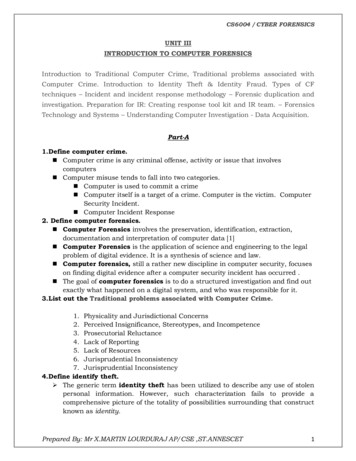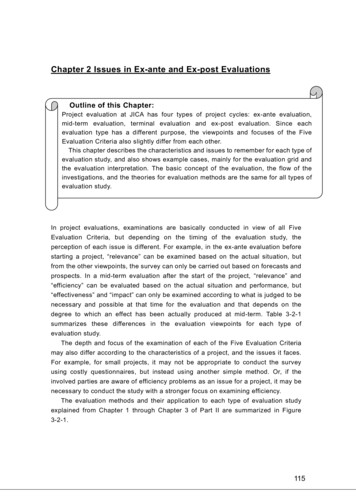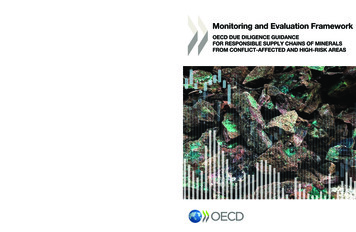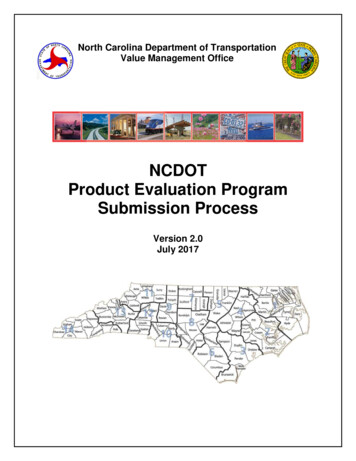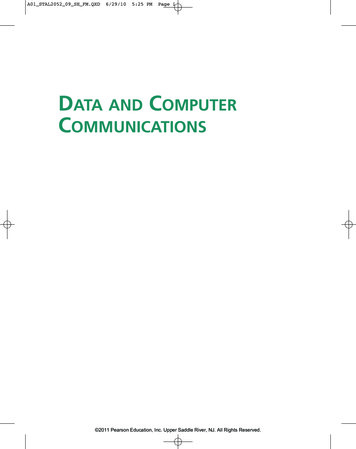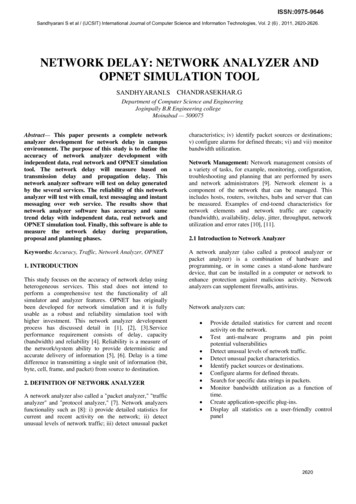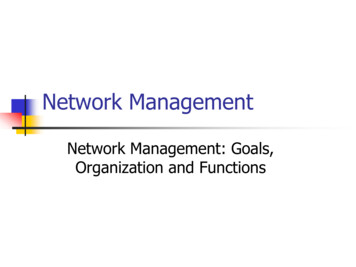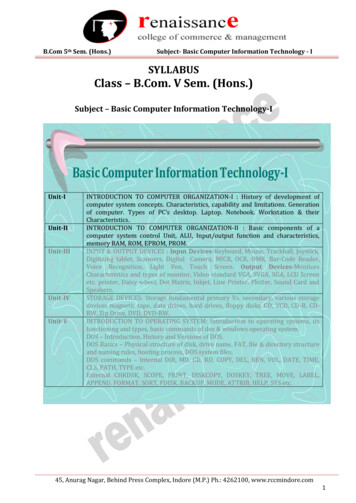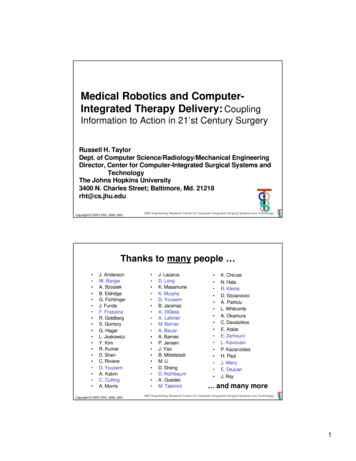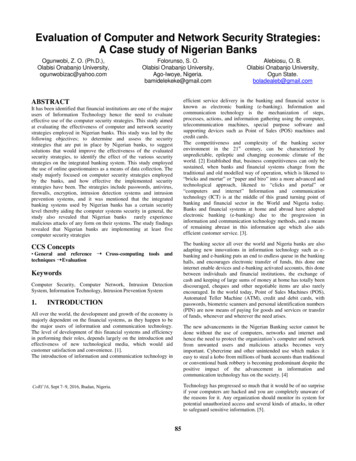
Transcription
Evaluation of Computer and Network Security Strategies:A Case study of Nigerian BanksOgunwobi, Z. O. (Ph.D.),Olabisi Onabanjo University,ogunwobizac@yahoo.comFolorunso, S. O.Olabisi Onabanjo University,Ago-Iwoye, Nigeria.bamidelekeke@gmail.comefficient service delivery in the banking and financial sector isknown as electronic banking (e-banking). Information andcommunication technology is the mechanization of steps,processes, actions, and information gathering using the computer,telecommunication machines, special purpose software andsupporting devices such as Point of Sales (POS) machines andcredit cards.The competitiveness and complexity of the banking sectorenvironment in the 21st century, can be characterized byunpredictable, epileptic and changing economic climate of theworld. [2] Established that, business competitiveness can only besustained, when banks and financial systems change from thetraditional and old modelled way of operation, which is likened to“bricks and mortar” or “paper and biro” into a more advanced andtechnological approach, likened to “clicks and portal” or“computers and internet” Information and communicationtechnology (ICT) is at the middle of this grand turning point ofbanking and financial sector in the World and Nigeria today.Banks and financial systems at home and abroad have adoptedelectronic banking (e-banking) due to the progression ininformation and communication technology methods, and a meansof remaining abreast in this information age which also aidsefficient customer service. [3].ABSTRACTIt has been identified that financial institutions are one of the majorusers of Information Technology hence the need to evaluateeffective use of the computer security strategies. This study aimedat evaluating the effectiveness of computer and network securitystrategies employed in Nigerian banks. This study was led by thefollowing objectives; to determine and assess the securitystrategies that are put in place by Nigerian banks, to suggestsolutions that would improve the effectiveness of the evaluatedsecurity strategies, to identify the effect of the various securitystrategies on the integrated banking system. This study employedthe use of online questionnaires as a means of data collection. Thestudy majorly focused on computer security strategies employedby the banks, and how effective the implemented securitystrategies have been. The strategies include passwords, antivirus,firewalls, encryption, intrusion detection systems and intrusionprevention systems, and it was mentioned that the integratedbanking systems used by Nigerian banks has a certain securitylevel thereby aiding the computer systems security in general, thestudy also revealed that Nigerian banks rarely experiencemalicious attacks of any form on their systems. The study findingsrevealed that Nigerian banks are implementing at least fivecomputer security strategiesThe banking sector all over the world and Nigeria banks are alsoadapting new innovations in information technology such as ebanking and e-banking puts an end to endless queue in the bankinghalls, and encourages electronic transfer of funds, this done oneinternet enable devices and e-banking activated accounts, this donebetween individuals and financial institutions, the exchange ofcash and keeping of large sums of money at home has totally beendiscouraged, cheques and other negotiable items are also rarelyencouraged. In the world today, Point of Sales Machines (POS),Automated Teller Machine (ATM), credit and debit cards, withpasswords, biometric scanners and personal identification numbers(PIN) are now means of paying for goods and services or transferof funds, whenever and wherever the need arises.CCS Concepts General and reference Cross-computing tools andtechniques EvaluationKeywordsComputer Security, Computer Network, Intrusion DetectionSystem, Information Technology, Intrusion Prevention System1.Alebiosu, O. B.Olabisi Onabanjo University,Ogun State.boladealeb@gmail.comINTRODUCTIONAll over the world, the development and growth of the economy ismajorly dependent on the financial systems, as they happen to bethe major users of information and communication technology.The level of development of this financial systems and efficiencyin performing their roles, depends largely on the introduction andeffectiveness of new technological media, which would aidcustomer satisfaction and convenience. [1].The introduction of information and communication technology inThe new advancements in the Nigerian Banking sector cannot bedone without the use of computers, networks and internet andhence the need to protect the organization’s computer and networkfrom unwanted users and malicious attacks becomes veryimportant. Cybercrime and other unintended use which makes iteasy to steal a kobo from millions of bank accounts than traditionalor conventional bank robbery is becoming predominant despite thepositive impact of the advancement in information andcommunication technology has on the society. [4]Technology has progressed so much that it would be of no surpriseif your computers are hacked and you are completely unaware ofthe reasons for it. Any organization should monitor its system forpotential unauthorized access and several kinds of attacks, in otherto safeguard sensitive information. [5].CoRI’16, Sept 7–9, 2016, Ibadan, Nigeria.85
Banking sector is a trust-based institution, that requires an absolutetrust from her customers, upon this the banking sector should takesecurity issues as a special concern to continually earn the trust oftheir customers, The need to tighten-up security and propermanagement channels that could give opportunities for fraud andmalicious attacks such as: breach of privacy of customer data,distributed denial of service attacks, and technological letdownscreated on electronic banking platforms becomes expedient.a means of preventing the host from future infections from any orsimilar malware and also dis-harming the host from malware. Theminimization of false positives (false alarms) and false negatives(missed malware) is encouraged during the stage of detectingmalware in the system.Malicious activities that are targeted at computer network systemscan be identified and responded to by a process called Intrusiondetection system (IDS). From this definition, intrusion detectioncan be seen as a process, which involves a system, individuals, andtools. [11] To reduce the risk of attacks precautionary measuresneeds to be put in place. Preventing all attacks seems practicallyimpossible but could be achieved with the right measures put inplace. Malicious activities can be easily identified and diagnosedwith a process which works similar to a burglar alarm, Intrusiondetection. Intrusion detection combines three activities majorly tomonitor, analyze, and respond. [12].Insecurity has been a major concern in the world’s most prominentsector (finance), bank accounts, transactions and funds transfer aretampered with as a result of this insecurity, which is constantlybeing faced by operators of the banking sector. These experienceshave become totally unfavorable, which have made the totaladoption of technologies in the banking sector difficult. Theinsecurity issue has been caused by the ripple effects maliciousattacks and threats like State-sponsored espionage, Distributeddenial of service (DDoS) attacks, password management, insiderthreat, privacy laws and viruses among others [6]. Thus, thisresearch is aimed at evaluating the computer and network securitystrategies employed by Nigerian banks. The following objectivesthat were used to achieve the aim were: the determination andidentification of the security strategies which are beingimplemented by banks in Nigeria, ascertaining the impact ofvarious integrated banking system on the total security of thebanking sector, to assess the security strategies employed byNigerian banks and also evaluate its effectiveness.Intrusion Prevention System (IPS) is a defense system that isprimarily network based, it properly combines the proactivetechnique of IDS with that of firewall as a result of increasingglobal network. The proactive technique of the system is to preventmalicious attacks before they enter into the system, it verifies andexamines various information records. The offending data isblocked and logged when an attack is identified on such data. [13].Encryption scrambles data thereby making the data very hard tofind useful by the intruder, the interpretation of a scrambled data ismeaningless if the intruder does not know how the scrambling wasdone. Encryption or scrambling is indeed an essential tool inproviding computer and network security [14]. Encryption clearlyaddresses the importance of data confidentiality. Additionally,encryption makes it difficult to easily alter or change data, becauseit has been scrambled this makes it generally hard to read orunderstand thereby ensuring data integrity. [14].An Important factor in an organization’s computer and networksystem is security, because the computer connects to othernetworks through the internet. An attack on the organization’scomputer can be possible from outside of the organization.Therefore computer network security is important to prevent andprotect the organization from internal and external attacks. [7]Computer and Network security is generally handled by the systemadministrator or network administrator who implements somesecurity policies, software and hardware needed to protect theentire computer system and its resources from any unauthorized orunwanted access and usage and the system administrator alsoensure ensures accessibility to the resources for authorized usage.The security system is based on layers of protection and consist ofmultiple components consisting of monitoring, security software,hardware and appliances. The security is the quality of state, whena computer system is secure it means it is free from potentialdanger. [8].Passwords have become the only barrier between just any user andone’s personal information and they most common and widelyused form of authentication. Several programs are available foreasy download, which makes it easier for attackers to “guess” or“crack” a password, a very good password and keeping thepassword confidential makes very difficult for an unauthorizedperson to gain access to your information. [15].Banking applications generally known as Core Banking System(CBS) are believed to have a level of security incorporated inthem, which helps militate against attacks on the applications andseveral servers attached, to this effect the need to review bankingsystem application security becomes very important. [16]Application security helps put stringent measures and controls inplace on an organization’s applications, which reduce the risk fromintruders using the application and the risk associated with theauthorized user using it.In a secure Core Banking System proper management ofinformation security is required and this can only be delivered avendor organization that manages information. Implementation ofInformation Security Management System (ISMS) on core bankingsystems makes the work easier for organization as specific areasand processes have been covered within the organization [16].The following are the security strategies being focused on andimplemented by Nigerian banks;A firewall is a defined as a perimeter fencing which serves aborder or control mechanism. Blocking or stopping traffic fromentering into a computer system is the main purpose of a firewall,traffic inside the computer could also be blocked by firewall aswell. Firewall serves as the first form of mechanism set up tocontrol intruder activity on the computer. Unauthorized ormalicious access in a computer network system can be preventedby firewall. The implementation of firewalls is done on thehardware or the software, or on both. [9]The need for antivirus software is prompted by the wide spread ofmalware on computer systems. [10] The presence of malware in acomputer system is detected by an antivirus installed in thecomputer system, the purpose of the antivirus is to identify thenature of the malware, and also remove the malware, which is also2.RESEARCH METHODOLOGYThe population of study is limited to computer security experts andinformation technology department staff in Nigerian banks. Eleven86
(11) commercial banks and one (1) mortgage bank randomly filledthe online questionnaire with a total of 30 respondents. The banksare: Ecobank, Guaranty Trust Bank, Skye Bank Nigeria PLC,Sterling Bank, Firstbank Bank, Fidelity Bank, Access Bank,Keystone Bank, Wema Bank, Zenith Bank, Diamond Bank andHaggai Mortgage Bank, while two (2) respondents did not providethe name of their banks.Three factors were considered when choosing the sample. The firstwas that, the respondent must be an IT/ICT staff of a Nigerianbank, the second was to have an idea of the bank’s computersecurity strategies and the third was the willingness of therespondents to cooperate, because some of the staff do not readilyhave interest in filling the online questionnaires.An online questionnaire (http://bit.ly/1J6baWS) was administeredfor data collection which was designed for computer securityexperts and information technology department staff in Nigerianbanks. An online questionnaire was preferred and chosen becausethe questionnaire was targeted at bank officials, who are verymobile and they always have access to the internet, and with thehelp of social media campaigns a wider number of respondentscould be easily be reached.Section A which contained the personal data of the staff, such as;age, bank type. It provided the background information needed inanswering the research questions. It also contained questions basedon the years of experience in the banking sector, years ofexperience with current bank and name of bank. Section B whichcontained achievement test items. The questions were twelvemultiple choice items in computer security.The criteria that were used to compare Avast, McAfee andWebroot antivirus were: On-demand scan refers to a manual scanwhich is being initiated by the user on the entire or certainsegments of the computer system, here the user initiates the scanand decides what part of the system should be scanned or if theentire system should be scanned.On-access scan refers to an automatically initiated scan which theproduct itself initiates without any external interference, it scansevery file whenever it is created and/or whenever it is modified,and here the antivirus initiates a scan immediately a new file iscreated on the system.CloudAV gives an efficient automatically initiated scan that isperformed on the cloud storage, and this happens frequently.Email Security gives our emails the desired security from virusesand malware, thereby preventing penetration, through our email.Intrusion Detection System (IDS): the process of identifying andresponding to malicious activities targeted at computing andnetwork resources.Intrusion Prevention System (IPS): is a defense system that isprimarily network based, it properly combines the proactivetechnique of IDS with that of firewall as a result of increasingglobal network.AntiSpam gives us the needed efficient protection from maliciousattacks such as: spam, scam and phishing attacks.Web protection comes in when surfing the internet and protect theuser from infected and malicious URLs, numerous phishingwebsites, this also protects us by giving us online bankingprotection and online identity protection (privacy).3.purpose of this study was to evaluate how effective computer andnetwork strategies put in place by Nigeria banks. This study strivesto provide answers to the under-listed research questions:i.What banks do the respondents work for?ii.What are the years of experience of the respondents?iii.What Computer security strategies are implemented?iv.Why is a particular anti-virus preferred to other antivirussoftware?v.How often has the bank suffered malicious attacks?vi.Why is a particular integrated banking system (CoreBanking System) preferred to other CBS software?How effective are the computer strategies implemented?3.1Bank of the respondentsFigure 1 showed the number of respondents that filled thequestionnaire from each bank. It was presented in Figure 1 showedthat Ecobank and Wema Bank for a larger percentage of the banksof respondent, while other percentages were spread across tendifferent banks while three respondents did not mention the namesof their banks. There are about nineteen (19) commercial banks inNigeria as at November 2015, eleven (11) commercial banksparticipated in this survey, and this indicates that over 50% ofNigerian commercial banks was involved in this research.Banks of Respondents5 543 32 21 1 1 1 1 1ECOBA WemaZenithGTBHaggaiSterlingNo FidelityFirstBa Keysto SkyeDiamo Access6420Figure 1 Banks of Respondent3.2 Years of experience of the respondents?Figure 2 summarizes the findings on years of experience of therespondents in the banking, and this ascertains that most of therespondents are either newly recruited staff or they have not stayedtoo long in the banking sector. This indicates that there level ofknowledge of the bank’s security strategies implemented could belimited as they have not spent so much time in that particular bankand this could also be a determinant of the level of management ofthe organization’s implemented security strategies, this also showsthat the respondents with not very long experience in a particularbank might not be aware of the malicious attacks experienced bythe bank in the past.Years of Experience5001 -4 yrs5 - 9 yrs10 - 14yrsFigure 2 Years of Experience of respondent3.3What Computer security strategies areimplemented?RESULT AND DISCUSSIONThis section is focused on the presentation and discussion of resultobtained during the course of this research. The data was collectedwith particular reference to the questions raised earlier on. TheFigure 3 shows that over 50% of the respondents implementedIntrusion Detection and Prevention in their company, 60%87
implemented Encryption, 76.6% Firewall, while almost 100% wereusing Passwords and Antivirus. It can then be deduced that sinceall the percentages of yes of respondents on each of the fivesecurity strategies in Figure 3 are at an average of 75.33%, whileaverage percentage of No and Not sure are 10 % and 14.67%respectively, we could then conclude that Nigerian banksimplement all five security strategies.The comparison of why Avast and McAfee are the most preferredand Webroot, the least patronized is showed in Table 2 fromFigure 4. The comparison tools ranged from on-demand scan,CloudAV, on-access scan, boot-time scan, firewall, Email security,Intrusion Detection System (IDS), Intrusion Prevention System(IPS), Anti-spam and web protection.It can then be deduced from the result presented in Table 2 thatAvast and McAfee was chosen over the Webroot antivirus, seeingthat the free versions of the Avast still has some security featuresalready integrated in them and the Premier version of the Avastantivirus has almost all security features integrated in it except forthe intrusion prevention system and the AntiSpam. McAfee on theother hand, for it McAfee Antivirus does not have CloudAV,firewalls, IDS, IPS, AntiSpam and web protection which still givesit a fair chance of usage but the McAfee Internet security has allsecurity features integrated into them which might not even requireuser to install other security strategies.Webroot, that happens to be the least on the chart in Figure 4which was also compared alongside with Avast and McAfee,happens not to have not too many security features integrated intoit secure anywhere antivirus other than on-demand scan and onaccess scan, this shows the very reason why Webroot antivirushappened to be in the bottom section of Figure 4.We would then conclude based on the comparison of differentantivirus software on Table 2 it shows that Avast Antivirussoftware has a high level of in-built security, which could be thereason why it is the most preferred by Nigerian bank96.67%3.33%0.00%%Not 67%10.00%13.33%93.33%6.67%0.00%Security Stragies ImplementedFigure 3 Security Strategies Implemented3.4Antivirus software preferenceFigure 4 showed the type of antivirus each Nigerian bank uses andit revealed Avast and MacAfee antivirus are predominantly usedwhile a small percentage of usage are spread sparsely across allother antivirus. Thus, the need to compare why Avast andMacAfee antivirus is preferred over the other and while some haveless patronage, which would in turn answer our research questionfour that is; Why is a particular anti-virus preferred to otherantivirus software?Table 2 Comparison of Avast, McAfee and Webroot AntivirusCompanySoftwareAvastAvast FreeAntivirusAvast ProAntivirusAvast InternetSecurityAvast PremierMcAfee AntivirusMcAfee vastMcAfeeMcAfeeWebrootComparison ToolsOn- On-access Boot-time CloudAV FirewallIDSdemandscanscansscanPresent sentAbsentIPSEmail AntiSpamWebsecurityprotection3.5 How often has the bank sufferedmalicious m securitywebrootThe result of how often the bank suffers from malicious attackwas presented and analysed in Table 2. It showed that on theaverage, 47% of the respondents from Nigerian banks havenever experienced any malicious attacks of any form on theirequipment or personal accounts, and just 37% only experiencedmalicious attacks less often, while only about 15% say that theirbanks often experience malicious attacks on their equipment.This indicates that the security strategies implemented could beeffective since malicious attacks where not very often.Figure 4 Antivirus used in Nigerian banks88
Table 3 Malicious Attacks on Nigerian BanksMalicious Attacksneverless oftenHow often have you been denied access to do50.00%30%legitimate work on your computer?How often has a laid back employee caused amalicious attack through the information he/she43.33%47%has?How often has the bank lost money due to malicious36.67%53.33%attack of any sort?70.00%20.00%How often has your password been bye-passed?How often do you experience virus attacks on your36.67%36.67%computer and network?Average47.33%37.33%Security strategy preferencevery .33%11.33%3.33%4.00%4.7 How effective are the computer strategiesimplemented?Why is a particular integrated banking system (Core BankingSystem) preferred to other CBS software?Core Banking Systems gives room from the implementationmost or all security strategies on them and this could be foundon any of the following Integrated Banking System application:AX, Finnacle, SAP, T24, Microsoft CRM, Phoenix, andFlexcube. As result of the resident security strategies on the corebanking system this goes to show that a relationship existsbetween computer security strategies implemented by banks andthe Integrated Banking System. Thus, there is a great impactfrom the Integrated Banking Systems on computer securitystrategies implemented in the banking sector.Figure 5 displayed that Flexcube polled highest followed bysome respondents who did not write the name of the integratedbanking system used by their banks, while Finnacle polled oneof the least results. So the need to review why Flexcube wouldbe preferred becomes important.The following are some of the features the Oracle Flexcubepossess:i. Capability to process large transaction volumes, withhigh value of availability all day.ii. A channel support of multiple delivery, which includingbranches, point-of-sale terminals, ATMs, mobiledevices, call centers, and internet bankingiii. A Web-based user interface resident on XML withcontext-sensitive helpiv. Role-based access and application are covered bySecurity management.v. Exception processing which is automated and onlinevalidations.vi. Combination deployment which could either becentralized or decentralized.vii. Existing systems are easily integrated using EnterpriseEdition technology, flexible Java Platform.Helps with collateral, and nonperforming assets which areOperational risk management controls.Figure 6 below depicts that computer and network securitystrategies which is currently deployed by Nigerian Banks areeffective. Based on the facts there have been no instances ofmalicious activities and absolutely no cases of it in most banksof the respondents, it was cited by 65% of the valid responsesthat the security strategies have been effective, hence the highestresponse being on effective.33.33%36.67%13.33%10.00%Effectiveness of Computer SecurityStrategies6.67%3.6oftenHow effective have these security strategiesimplemented?Figure 6 Effectiveness of Implemented Computer SecurityStrategies4.DISCUSSION[17] Stated that currently most financial institutions includingbanks employ security mechanisms such as Secure SocketLayers, digital certificates, data encryption which secures datatransferred over the internet, etc. In protecting customerinformation stored within their servers, most financialinstitutions use firewalls, virus detection and preventionmethods, efficient backup servers as a means of preventivemeasures. From this a strong base is gotten for the result thatbanks in Nigeria are implementing effective computer andnetwork security strategies.One of the research question was, what antivirus software arethese banks using? And antivirus software is one of keycomputer security tools.Analyzing the responses, the result shows that two types ofantivirus were predominantly used in Nigerian banks, and theseare McAfee Antivirus and Avast Antivirus and from acomparison of both antivirus from Wikipedia which was shownTable 2 showed why most Nigerian banks would opt for eitherof the two antivirus software, from Wikipedia both McAfee andAvast have the highest number of in-built security.Another research question was, which integrated bankingsystems are Nigerian banks using? [6] Submitted that integratedIntegrated Banking Systems151050Figure 5 Integrated Banking System Used in Nigeria89
banking systems have in-built security tools, and all Nigerianbanks need to implement an effective and reliable Integratedbanking system which would enhance the computer securitystrategies. All Nigerian banks are using integrated bankingsystem, and from our study it shows that a particular bankingapplication is majorly used by Nigerian banks, which isFlexcube, which could mean that Flexcube is more reliable,efficient and secure.The general research aim, which was to know how effectivecomputer and network security strategies have been afterimplementation, and from the result of our research questionseven, it shows that computer and network security strategiesimplemented in Nigerian banks are effective. This contradicted[18] who cited that the computer security strategies implementedare not effective due to several examples of banking relatedfrauds that are still very rampant and [19] who also stated that efraud is a way Nigerian banks still keeps losing money which isdue to ineffective computer and network security strategies. Aneffective mixture of computer and network security strategiesare being implemented by Nigerian banks, examples of suchstrategies include passwords, encryption, intrusion detection andprevention systems, firewalls, integrated banking application.5.[3] Tunmibi S. and Falayi E. (2013), IT security and e-bankingin Nigeria, Greener journal of internet, information &communication system. Vol 1 (3), pp 061 – 065, August.[4] Wada F., Longe O. and Danquah (2012), actions speakslouder than words – understanding cybercriminalsbehaviour using criminological theories. Journal of internetbanking and commerce, April, vol. 17, no 1[5] Courtney H. (2014), Importance of network security forbusiness organization, avalan wireless blog, May 7[6] Zimucha T., Ngonidzashe Z., Kerina C., Elijah C.,Petronella M. Tinovimbanashe M.,(2012), An evaluation ofthe effectiveness of e-banking security strategies inZimbabwe: a case study of Zibabwean commercial banks.Journal of internet banking and commerce, December, vol.17, no. 13.[7] CholatipYawut and PhattarapongKeawpipop (2011) TheFuture of Organization’s Computer Network security forthe next five years (2011- 2015) by using the DelphiTechnique. International Conference on Information andElectronics Engineering, Volume 6[8] AartiRamehSonone, (2015), Security Techniques Used inComputer Networking, Indian Streams Research Journal,Volume 5, Issue 9.[9] Adeyinka, O. (2008), "Internet Attack Methods andInternet Security Technology," Modeling & Simulation,2008.AICMS 08. Second Asia International Conference on,vol., no., pp.77‐82, 13‐15 May[10] Peter Szor, (2005), Art of Computer Virus Research andDefense, Addison-Wesley.[11] Kruegel, C., Valeur, F., Vigna, G., Intrusion Detection andCorrelation Challenges and Solution, XIV, 118P[12] Richard B. (2005), Tao of Network Security Monitoring:Beyond Intrusion Detection, Addison-Wesley.[13] Hu L., Wang W., and Zhao K. (2011), “The Design andImplementation of Trusted Communication Protocol forIntrustion Prevention System,” Journal of ConvergenceInformation Technology, vol. 6, pp. 55-62[14] Charles P. Pfleeger, Shari Lawrence Pfleeger (2003)Security in Computing, Chapter 1; Is There A SecurityProblem in Computing.[15] US-CERT (2013), Security Tips; Choosing and ProtectingPa
the use of online questionnaires as a means of data collection. The study majorly focused on computer security strategies employed by the banks, and how effective the implemented security strategies have been. The strategies include passwords, antivirus, firewalls, encryption, intrusion detection systems and intrusion prevention systems, and it was mentioned that the integrated banking systems .
